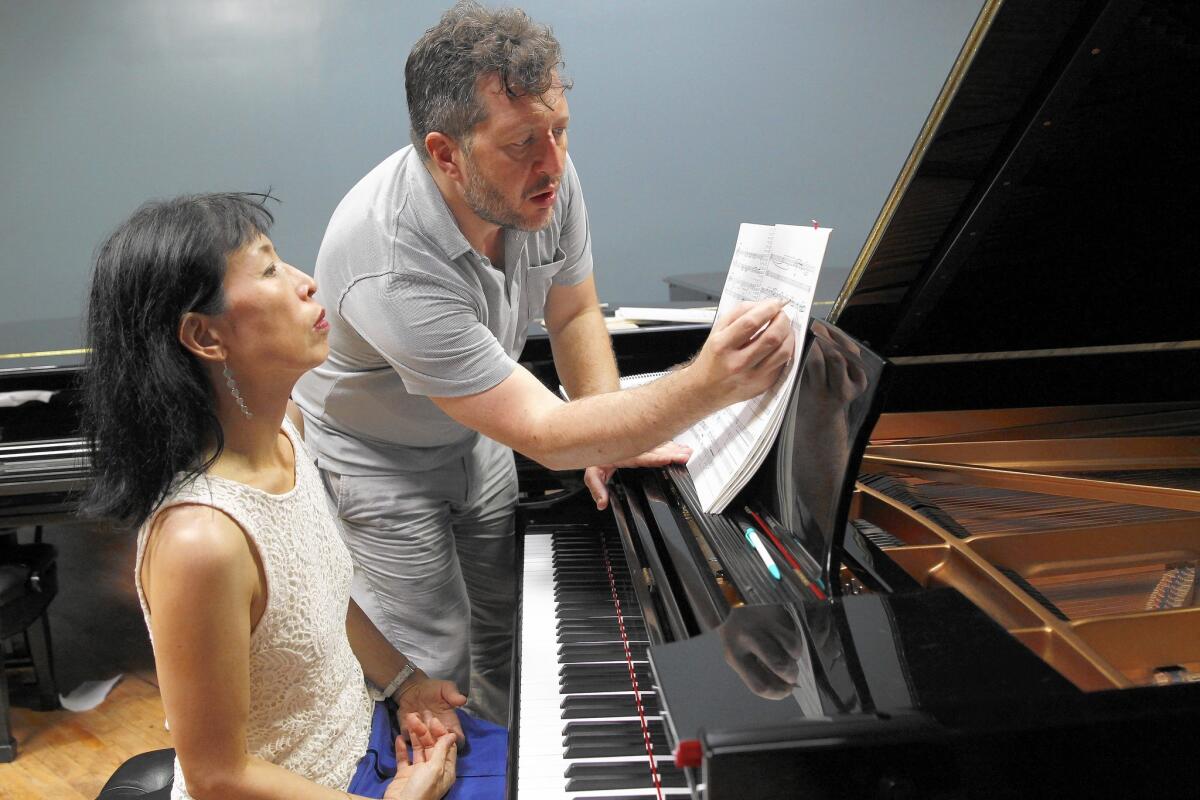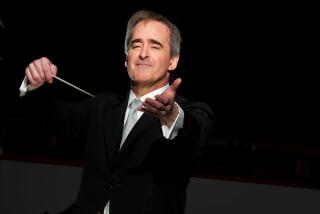Composer Thomas Adès devotes his downtime in L.A. to ... rehearsing

Thomas Adès comes to Los Angeles to get work done.
So you might be surprised to learn what the British composer — who’s on deadline to finish his third opera, “The Exterminating Angel,” in time for next year’s Salzburg Festival — does with his spare time while here in L.A.
To relax after composing, Adès has been rehearsing a handful — actually two handfuls — of difficult modern piano pieces to play for a Tuesday recital in Zipper Hall at the Colburn School.
SIGN UP for the free Essential Arts & Culture newsletter >>
This paradox is not lost on Adès or his collaborator in the recital, pianist Gloria Cheng, who both sat down for tea on a recent afternoon. “It sounds crazy to talk of this concert as a diversion or time off,” Adès says between sips of hibiscus lemonade, “but it’s more like something to take my brain off the opera.”
Cheng, a longtime L.A. resident and frequent interpreter of Adès’ piano work, laughs. “Well, this for him is a light diversion,” she says. “For me, a light diversion is sitting by a pool.”
Tuesday’s Piano Spheres recital came about for two reasons: First, Adès and Cheng have wanted to perform together (the two first met at the Ojai Festival in 2000), and second, Susan Bienkowski commissioned Adès to arrange the 2009 Concert Paraphrase of his first opera, “Powder Her Face,” for two pianos.
“Sue and I had been talking for a while,” Adès says. “Maybe two or three years.”
Cheng corrects him. “It’s been in the air, I’d say, for at least five years. At least.”
Adès seems taken aback. “It takes me so long to write these operas. The years just evaporate,” he says in astonishment. “I’m shocked to hear that.”
Time is very much on Adès’ brain. The in-demand composer, besides being on a deadline for his opera, also performs regularly at major international venues as both a conductor and pianist. To hear Adès play the piano in concert is a particular delight — Times music critic Mark Swed described Adès’ technique at a 2006 Piano Spheres recital as “big and bold.”
Cheng concurs with that assessment. “He makes such a huge sound at the piano.”
Adès admits that the four pieces he and Cheng will play are taking their toll in rehearsal: “We played through the whole thing the other day, and I have to be a bit careful that I literally don’t bruise my fingers by the end of the night.”
The program the two selected to play, which includes the Adès premiere, and two-piano works by Ligeti, Nancarrow and Messiaen, also is taxing for Cheng. “My whole body feels like it’s had a workout. I don’t swim or do my normal exercise routine when we rehearse these pieces.” (The two will perform the same program at San Francisco’s Herbst Theatre on Oct. 30.)
Despite the physical and intellectual rigor needed for this repertoire, Adès insists that the rhythm of composing in the morning and rehearsing these demanding piano works in the afternoon “is perfect.”
“There’s something about this place that is calming for me,” he insists, pointing up toward the Hollywood sign and Beachwood Canyon, “I think it’s got a lot to do with nature. You’re actually surrounded quietly by nature here, more than you are in London.”
Adès has been under the influence of Los Angeles since the moment he stepped off the plane from his native England. Betty Freeman, L.A.’s great champion of new music, picked up Adès at the airport on his first visit in the 1990s.
“In retrospect, she really set out to kind of seduce me with the city that very first day,” he recalls. After driving him past the Hollywood Bowl, where he saw his name on the Bowl’s marquee, “then she drove me up to see David Hockney — and I didn’t know that’s who we were going to see. She just said we were going to visit a friend of hers in the hills. I realize now I was being thoroughly wooed.”
Adès now spends half his time in L.A. “I’m a sort of migratory bird,” he says. The months here feel much longer to him.
“The afternoons are infinitely quieter here in L.A. because most of the rest of the world has gone home. New York’s gone home, and London’s gone to bed,” he remarks, “If you’re a nocturnal worker, the afternoons of L.A. are actually night everywhere else — so they are miraculously peaceful, and they seem to go on forever.”
As important as L.A.’s prolonged afternoons are — this is when Adès rehearses at the keyboard, orchestrates his scores or just goes for walks — his productive mornings are part of why he returns to Southern California each year.
“I compose in the mornings,” he says, “it’s like a kind of plant, you have to water it, you’ve got to do it every day. Some days it’s more, some days it’s not. I don’t do anything else in the morning.”
His mornings, as he works on his third opera, have been fruitful of late. Adès just shipped off the score of the first act to his London publisher. “It does seem to be working,” he says, “I can write bigger pieces here.”
Based on Luis Buñuel’s 1962 surrealist film comedy “The Exterminating Angel,” the opera opens in Salzburg, Austria, next year, followed by an engagement in Covent Garden in London the following spring and then the Metropolitan Opera’s 2017-18 season for its U.S. premiere.
After “The Exterminating Angel,” Adès has another big piece: He’s been commissioned to write a piano concerto for Kirill Gerstein and the Boston Symphony.
But right now he’s focused on the Piano Spheres recital at Zipper Hall. In particular, the premiere of his four-handed paraphrase of “Powder Her Face.”
“It’s so rewarding, so difficult,” he says of his challenging solo composition, “The whole point for the two-piano version was finally to have a piece that was actually playable … and I think I might have found some new notes in it.”
Cheng concurs. “There are new voices in there that aren’t in the solo version … but the aggregate effect is still a lot of notes.”
A lot of notes indeed. So really it’s not surprising that someone who spends his downtime playing — and arranging — nearly impossible-to-play piano pieces, is also famous as a composer for creating daunting parts for soloists.
The much-anticipated “The Exterminating Angel” promises to be his most ambitious work yet. “I don’t mean for things to be difficult. It just happens,” Adès says, smiling impishly, “I just happen to think there’s a huge difference between impossible and difficult. All the difference in the world, really.”
More to Read
The biggest entertainment stories
Get our big stories about Hollywood, film, television, music, arts, culture and more right in your inbox as soon as they publish.
You may occasionally receive promotional content from the Los Angeles Times.






